Biotechnology and genetic engineering have ushered in a new era of possibilities, from advancements in medicine to improvements in agriculture. However, as these technologies become increasingly powerful, ethical considerations come to the forefront. This article explores the ethical dimensions surrounding biotechnology and genetic engineering, examining the implications, concerns, and the importance of responsible practices in these fields.
Medical Breakthroughs
Biotechnology has paved the way for groundbreaking medical advancements, from personalized medicine to gene therapies. Genetic engineering allows for the modification of genetic material, holding the potential to treat and even cure genetic diseases.
Agricultural Innovation
In agriculture, genetic engineering has led to the development of genetically modified (GM) crops with traits such as resistance to pests and improved nutritional content. These innovations aim to enhance crop yield, reduce environmental impact, and address global food security challenges.
Designer Babies and Genetic Enhancement
The prospect of “designer babies” raises ethical questions about the potential misuse of genetic engineering for non-therapeutic purposes. The ability to select specific traits in embryos poses concerns about creating societal divisions based on genetic enhancements.
Informed Consent and Genetic Testing
As genetic testing becomes more prevalent, ensuring informed consent and privacy protection are crucial ethical considerations. Individuals must be fully informed about the implications of genetic testing, and their genetic data must be handled responsibly to prevent unauthorized access and discrimination.
Environmental Impact
Genetically modified crops have faced scrutiny regarding their environmental impact. Concerns include unintended consequences on non-target organisms, the development of resistant pests, and potential ecological disruptions. Responsible management practices are essential to mitigate these concerns.
Access and Equity
The distribution and accessibility of genetically modified crops raise questions of equity. Ensuring that benefits reach farmers in economically disadvantaged regions and addressing potential monopolies on genetic resources are imperative ethical considerations in agricultural biotechnology.
Genetic Privacy
The increasing availability of genetic information raises concerns about privacy. Safeguarding genetic privacy involves addressing issues such as unauthorized access to genetic data, potential misuse by insurance companies, and protecting individuals from genetic discrimination.
Biosecurity Risks
Advancements in biotechnology also bring biosecurity risks. The potential misuse of genetic engineering for harmful purposes, such as the creation of bioweapons, underscores the need for robust ethical frameworks, international cooperation, and regulations to prevent misuse.
Regulatory Oversight
Implementing strong regulatory oversight is crucial to ensuring the responsible development and application of biotechnology and genetic engineering. Robust regulations help safeguard against unethical practices, promote transparency, and ensure accountability.
Public Engagement and Dialogue
Engaging the public in discussions about biotechnology and genetic engineering is essential. Informed public input can help shape ethical guidelines, policies, and regulations, ensuring that societal values and concerns are considered in the development and application of these technologies.
Balancing Innovation and Ethical Considerations
Striking a balance between fostering innovation and addressing ethical considerations is a complex but necessary task. Responsible practices, ethical frameworks, and ongoing dialogue will help navigate the evolving landscape of biotechnology and genetic engineering.
Conclusion
Biotechnology and genetic engineering hold immense potential to address pressing challenges in healthcare, agriculture, and beyond. However, harnessing these technologies ethically is paramount to avoid unintended consequences and safeguard individual rights, environmental integrity, and societal well-being. As we continue to unlock the secrets of life through biotechnology, a thoughtful and ethical approach ensures that the benefits are realized responsibly and inclusively.
FAQs
What are the ethical implications of genetic engineering in humans?
Ethical implications in human genetic engineering include concerns about “designer babies” and genetic enhancement. Questions about informed consent, privacy, and potential societal divisions based on genetic enhancements are central ethical considerations.
What ethical considerations exist in agriculture related to genetic engineering?
Ethical considerations in agriculture include concerns about the environmental impact of genetically modified crops, access and equity in the distribution of benefits, and responsible management practices to address potential ecological disruptions and economic disparities.
What privacy and security concerns are associated with genetic information?
Privacy concerns in genetic information involve issues such as genetic privacy, unauthorized access to genetic data, and potential misuse by insurance companies. Security concerns include biosecurity risks, highlighting the need for ethical frameworks, regulations, and international cooperation.
Why is regulatory oversight important in biotechnology and genetic engineering?
Regulatory oversight is crucial to ensure responsible development and application of biotechnology and genetic engineering. Strong regulations help prevent unethical practices, promote transparency, and hold individuals and organizations accountable for their actions.



